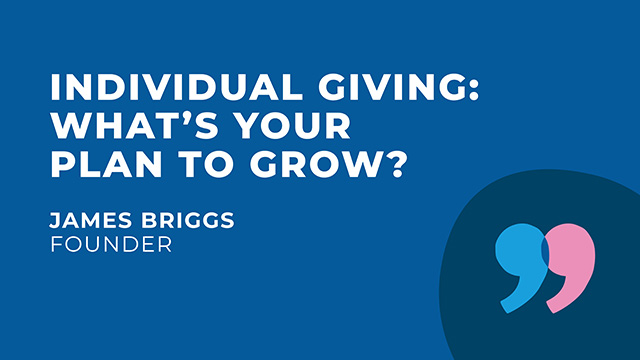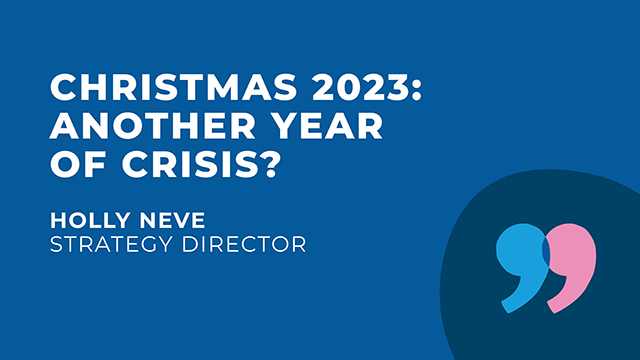Building Marie Curie’s fundraising with Charity Benchmarks

In this Q&A, Richard Lee, Director of Fundraising, and Mark Lumby, Head of Fundraising Analysis and Insight at Marie Curie, share their experience on the benefits of Charity Benchmarks in today’s challenging fundraising environment.
Benchmarking can be an invaluable tool for fundraising teams, providing a wealth of insights that not only sharpen strategies but also improve internal operations and team morale.
Marie Curie has taken part in Charity Benchmarks for five years, and the organisation is joining us again for our next cohort, using insights as a foundation to assess their performance and guide their planning.
Read on to find out why and learn more about joining them in this year’s study.
How do you and your team use benchmarking insights, and how often?
We use the Charity Benchmarks results consistently throughout the year. When we first receive the reports, we share them with our teams and review them for any trends, opportunities, or areas where we’re performing well compared to others. We revisit the data after our follow-up call with Open, where they walk us through key findings. Charity Benchmarks plays a key role in our strategic planning, helping us set realistic targets for the upcoming year.
We also use Charity Benchmarks to assess acquisition campaigns, especially in comparing our cost-per-acquisition (CPA) to industry standards. It helps us make informed decisions on future campaigns and provides additional insights for performance analysis, allowing us to answer ad hoc questions about specific campaigns. Overall, Charity Benchmarks is an invaluable resource that we turn to frequently throughout the year.
What’s involved in gathering and submitting the data for Charity Benchmarks? Has this changed over time?
Yes, our approach has evolved. When we first participated, most of the data submission was handled by our Analysis & Insight team, which involved a lot of script writing. Over time, we’ve streamlined the process by involving multiple teams. Each team now provides the data they’re most familiar with, like income and expenditure. This makes the results easier to understand and allows teams to focus on analysing the insights rather than just interpreting the numbers.
Now, a lot of the work is about coordinating inputs from different teams. We provide clear definitions, share documents for them to fill in, and send reminders to keep everyone on track. This collaborative approach not only makes data collection easier but also improves the team’s familiarity with the metrics.
What would you say are the main benefits of Charity Benchmarks for Marie Curie?
Charity Benchmarks offers several key benefits. It’s invaluable for comparing our performance to the industry, helping us spot where we’re excelling and where there’s room to improve. For instance, it allows us to size up growth opportunities, see which acquisition channels are performing well, and identify potential areas for optimisation.
Another benefit is the fresh perspective benchmarking provides. Seeing industry-wide trends lets us understand if the patterns we’re seeing are unique to us or are industry-wide. This objective insight is essential for strategic planning, where we use benchmarks to set achievable goals.
Charity Benchmarks also helps us celebrate our successes, which boosts team morale. Knowing that we’re performing well, especially in a tough fundraising climate, reassures the team and gives us a solid response when discussing performance with senior stakeholders.
Has Charity Benchmarks led to specific improvements in key fundraising areas?
Absolutely. Here are some examples of how Charity Benchmarks has impacted specific channels:
Digital: Charity Benchmarks confirmed our hypothesis that we weren’t fully maximising our digital income. It gave us the data to make a strong case for increasing our digital resources. Now, we’re prioritising specific digital initiatives with clear growth potential, and we’re already seeing positive results from this focus.
Individual Giving (IG): Charity Benchmarks has provided valuable insights for our IG strategy. It helped us identify areas where we’re already performing well and should maintain our efforts, as well as areas where we’re below the sector average. These insights allow us to focus our resources where they’re most likely to make an impact, helping us build a stronger, more targeted IG strategy.
Are there any challenges you’ve encountered with the benchmarking process?
Yes, there are some challenges. The benchmarking report is very comprehensive – it’s a lengthy document with hundreds of slides, which can be a lot to take in. Teams sometimes need guidance, which Open provides, to interpret specific graphs or metrics, especially if the definitions differ from what we use internally.
But it’s absolutely worth it in the long run and we’ve learned to use Charity Benchmarks as a starting point for asking questions, rather than seeing it as a definitive answer. This approach helps us turn the insights into practical, data-driven actions.
In short, why does Marie Curie continue to participate in Charity Benchmarks?
Charity Benchmarks has become an indispensable part of our strategy. It allows us to compare ourselves directly to the sector, giving us an accurate picture of where we stand. This is incredibly valuable in today’s challenging fundraising landscape, as it gives us a balanced perspective on our strengths and areas for improvement.
Charity Benchmarks helps us focus on growth opportunities and lets us validate our successes, both of which build confidence within the team. By having this outside perspective, we can see if we’re weathering challenges better than others, which is especially useful when discussing performance with senior stakeholders.
In short, Charity Benchmarks gives us a clear, data-driven foundation for strategic decisions, making it a crucial resource as we continue to evolve and strengthen our fundraising efforts.
“Charity Benchmarks has become an indispensable part of our strategy. It allows us to compare ourselves directly to the sector, giving us an accurate picture of where we stand.”
Join Charity Benchmarks before January 2025
Following our partnership with Sequoia and improvements to make participating in Charity Benchmarks easier and better than ever, we’re in the final stages of recruiting for our next cohort which already includes Marie Curie, Great Ormond Street Hospital Charity, British Red Cross, and NSPCC.
Designed specifically for medium and large charities, with resources provided from the report to support small charities, you will receive comprehensive insights to highlight where you’ve been, and where you need to go next.
Offering deep insights into the strategic and cultural aspects of the sector, you’ll get:
- A 250 page bespoke report benchmarking your programme and qualitative trends against the market
- A sector-level report examining overall market context, trends and strategy
- An Individual Giving ‘Deep Dive’ document comparing costs and volumes by channel
- An exclusive webinar presenting our findings to the cohort
- A bespoke presentation of your results from our strategy team
The reports cover the full range of fundraising income sources – from cash giving and retail to corporate and statutory funding – and focus on the key metrics you need right now including:
- Revenues
- Fundraising costs
- Supporter volumes
- Recruitment performance and CPA
- Retention rates
- Staffing levels and resource
We also collate and analyse more qualitative data including:
- Fundraising plans and priorities
- Targets and confidence levels
- Fears for the future
- Innovation and diversification
- Team function, culture and morale
- Attitudes at exec and trustee level
Register and share your data before January 10th to make 2025 your best year yet.
Email Liz Campbell-Black today to explore participation costs for your charity and secure your space.

